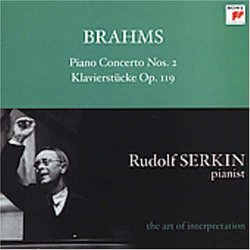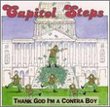| All Artists: Johannes Brahms, George Szell, Cleveland Orchestra, Rudolf Serkin Title: Brahms: Piano Concerto No. 2; Klavierstücke, Op. 119 Members Wishing: 0 Total Copies: 0 Label: Sony Release Date: 2/22/2005 Album Type: Original recording remastered Genre: Classical Styles: Forms & Genres, Concertos, Historical Periods, Modern, 20th, & 21st Century, Instruments, Keyboard, Symphonies Number of Discs: 1 SwapaCD Credits: 1 UPCs: 827969390627, 5099751649823 |
Search - Johannes Brahms, George Szell, Cleveland Orchestra :: Brahms: Piano Concerto No. 2; Klavierstücke, Op. 119
 | Johannes Brahms, George Szell, Cleveland Orchestra Brahms: Piano Concerto No. 2; Klavierstücke, Op. 119 Genre: Classical
|
Larger Image |
CD DetailsSimilar CDs |
CD ReviewsA classic, worthy to stand with the best Santa Fe Listener | Santa Fe, NM USA | 11/21/2005 (5 out of 5 stars) "In 1966, when Rudolf Serkin recorded this Brahms Second, he was a cultural icon, one of the most eminent European emigres in New York, and especially identified with Mozart, Beethoven, and Brahms. His partnering with Szell has been wrongly overshadowed by the Fleisher/Szell set of both Brahms concertos--Serkin is by far the more mature musician. Until this remastering, the only reason to avoid this recording was the sound--a prominent clattery piano without much glow backed by a somewhat wiry orchestra. Now the sound is polished up, though Serkin is still very close and the solo cello in the slow movement is much larger than life. But how beautifully both play together! Serkin's style, which has been called modest, selfless, ascetic, and classical, is hard to describe, in that he isn't a typical German romantic or a Russian powerhouse. The closest comparison, I suppose, is to Artur Schnabel, but Serkin has a better technique. He draws you in by his refusal to play a superficial note; this is like hearing a sonata recital, and Szell is similarly serious. At moments the results can sound a bit plain Jane compared to Richter or Pollini, but by the time the slow movement arrives, you find yourself deeply involved. The filler is a beautiful set of Brahms Op. 119 incidental pieces from 1979, played with the same unaffected mastery." LESSER OF TWO GOODS DAVID BRYSON | Glossop Derbyshire England | 03/15/2006 (3 out of 5 stars) "This disc would have got a higher rating from me if I didn't happen to own Serkin's performance of the concerto from 1960 with Ormandy and the Philadelphia. However before we even get to assessing the relative merits of the performances, I have to say that the recording, allegedly remastered, is not everything it might have been. The sound in the concerto is rather dull, and something has gone quite seriously wrong with it in the solo pieces. I have them on LP as well, and I don't recall the recorded quality as being as bad as it is here. I quite admit that Serkin's touch in his later years had changed, losing much of what made it so hard to mistake in his prime, but it was never, on record elsewhere or in real life, anything like the thin and emaciated offering we are given in the first two intermezzi here. This is the greater pity since these are much the best played of the four op 119 numbers. Serkin's account of them is profound and searching - lonely, sad and with deep shadows even in the waltz-section of the second piece. Recording-wise matters improve slightly in the C major intermezzo and the rhapsody, but sadly the performances go the other way. The intermezzo is all right basically, but it could have done with a faster speed and more quirkiness in the expression, and the rhapsody is just simply too slow and lumbering for my own liking.
Taken just on its own, this performance of the mighty B flat concerto is actually rather good. It needs no saying that Serkin and Szell were musical partners with an uncommon degree of mutual understanding, that the Cleveland Orchestra is one of the world's finest, and that both soloist and conductor had an uncommon intellectual and spiritual grasp of this great work. However I'm neither prepared nor even able to take it just on its own, because Serkin's 1960 performance is quite simply the greatest I have ever heard in my life, despite two minor finger-slips in the first movement. For fire, technical address and commitment it equals the earlier of Gilels's recordings, issued only a few months after it, and in terms of subtlety, insight and rhythmic control it surpasses it. The performance may not actually be available in America currently, but you should still be able to get it in Europe on the Sony Retrospective label (coupled with the Strauss Burleske), and some genuine remastering seems to have been done, because the recorded sound, not quite equal to what Gilels was given in the original issue, is now as fresh as paint. It had always had one significant thing going for it, namely an exceptionally magnificent-sounding piano, and the tone of that is captured with thrilling vividness on the cd. What I'm meant to be reviewing here is the 1966 account, so I suppose I could summarise it as being basically very similar to the 1960 one but with all the best things toned down a little. Speeds in the three fast movements are just a tad slower here, but the difference in quality is not the result of the slower speeds, the slower speeds are the result of the difference in quality. I could prolong this notice to outrageous length if I were to enumerate the instances I have in mind, so I shall confine myself to the tempo taken for the final allegretto grazioso. This is one of the hardest to judge in all 19th century music, and I find that anything even slightly adrift of my own idea of it (basically the speed Backhaus took in his pre-war issue) sets my teeth on edge. The 1966 performance gets it right, but the 1960 version gets it righter than right. There is a liner note of the familiar kind by Andre Tubeuf, with a translation of the familiar kind too. If you think it worth the trouble of reading, I may as well point out that Tubeuf is not responsible for designating the op 119 pieces `variations'. You will not really go wrong with this issue, but there is a very much better alternative that was still available only a few months back." |

 Track Listings (8) - Disc #1
Track Listings (8) - Disc #1